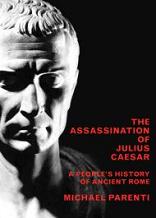
The Assassination of Julius Caesar
Michael Parenti
276 pages including index
published in 2004
All history is interpretation. That simple truth is hammered home in this book, The Assassination of Julius Caesar, offering a radical new context for the events of the fifteenth of march 44 BCE. The facts remain the same, but the assumptions with which Michael Parenti looks at the murder of Julius Caesar differ so much from the classical interpretation that almost an entirely new history is revealed. It's a powerful antidote against so much pop history presented as if free from any social and ideological context, usually because it's written from the safe cocoon of the dominant ideological assumptions of the day.
I picked up The Assassination of Julius Caesar when I saw it in the local library because I recognised it from a review Resolute Reader did two years ago. He described it as an antidote to the much more common interpretation of Roman history as the tales of great men. What Parenti does instead is to place the murder of Julius Caesar in the context of the class struggle going on in the late Roman Republic.
That may sound anachronistic, because our idea of class struggle and class itself is so bound up with the whole political history of Marxism and its descendants and the context in which Marxism evolved, that it seems odd to talk about class struggle outside the context of industrial societies. However, even Karl Marx himself said that "the history of all hitherto existing societies is the history of class struggles". Looking at pre-industrial history, even ancient history through the lens of class struggle is possible as long as it isn't done dogmatically or simplistically. Fortunately Parenti does neither.
As the subtitle -- A People's History of Ancient Rome -- indicates, Parenti intends this book as a counter to what he sees as the largely elitist interpretation of Roman history as found both in ancient as well as modern historians, who tend to identify with the ruling classes. Their histories therefore are full of great men doing great deeds, with an emphasis on their personalities as explenations for their actions. The masses of poor, working and middle class Romans, when they're mentioned at all, are dismissed as the rabble.
Parenti explains how this elitist point of view has influenced the interpretations of the murder of Julius Caesar. In this view Caesar was a despot or would be despot who wanted to crown himself king of Rome, while his assassins were motived by a desire to restore the ancient liberties of the Roman Republic. Ironically, through their actions the conspirators achieved the exact opposition: the civil war that followed led to the coronation of Octavius as first emperor of Rome.
This, according to Parenti, is nonsense. Caesar was murdered not because of his ambitions, but because he threatened the status quo. The Roman Republic was an oligocracy, while Caesar was a champion, though a flawed champion of the common people, part of the Populares ("favouring the people") tradition who believed the people of Rome as a whole should Rome, as opposed to the Optimates ("Best men"), who believed it was the elite's duty to keep the rabble in its place. The latter grouping was the most rich and powerful and usually had a stranglehold on the Roman Senate and other sources of power, while the Populares tried to make an end run around an increasingly less democratic Senate by using the other democratic institutions of Rome. The assination of Caesar and subsequent civil war was the ultimate outcome of a struggle that had been going on for the best part of the Republic's existence, a struggle the Optimates ultimately won precisily through the coronation of Octavius as Augustus. Under Augustus their position was no longer threatened by the rabble; if that meant giving up political power that was a small price to pay. Traditional historians tend to side with the Optimates, presenting them as being concerned with upholding the constitution of the Roman Republic rather than with defending their own priviledged status in life.
Parenti shows how wrong this is in his recount of the history of the Populares movement by showing the contradictions in the accounts of these historians. Optimate violence and repression is either covered up or presented in favourable terms, while everything the various Populare leaders did is presented in the least favourable light. By portraying reformers like Tiberius and Gaius Gracchus as tyrants or would-be tyrants and their followers as criminals and runaway slaves, by presenting conservative repression and mass murder as defence of the Republic, as responging to the supposed threat the reformers were to Rome and its constitution, ruling class violence is explained away, while isolated incidents of reformer violence or even their rhetoric is taken as a sign of their essential villainy. It all sounds horribly modern, doesn't it? In similar ways the 1973 coup against Allende and the ensuing repression of the Chilean people has been justified too.
The Assassination of Julius Caesar is therefore an useful antidote against a too elitist, great men view of ancient history, a reminder that the same fights being waged today were fought way back then as well. It's not the whole truth, but no one interpretation of history ever is. Whether you trust Parenti will probably depend as much on your own political outlook as it does on his writing and I must admit he's a bit shrill at times. Nevertheless, an interesting and important book to counter more conservative interpretations of Roman history.
Read more about:
Michael Parenti,
The Assassination of Julius Caesar,
Rome,
ancient history,
book review